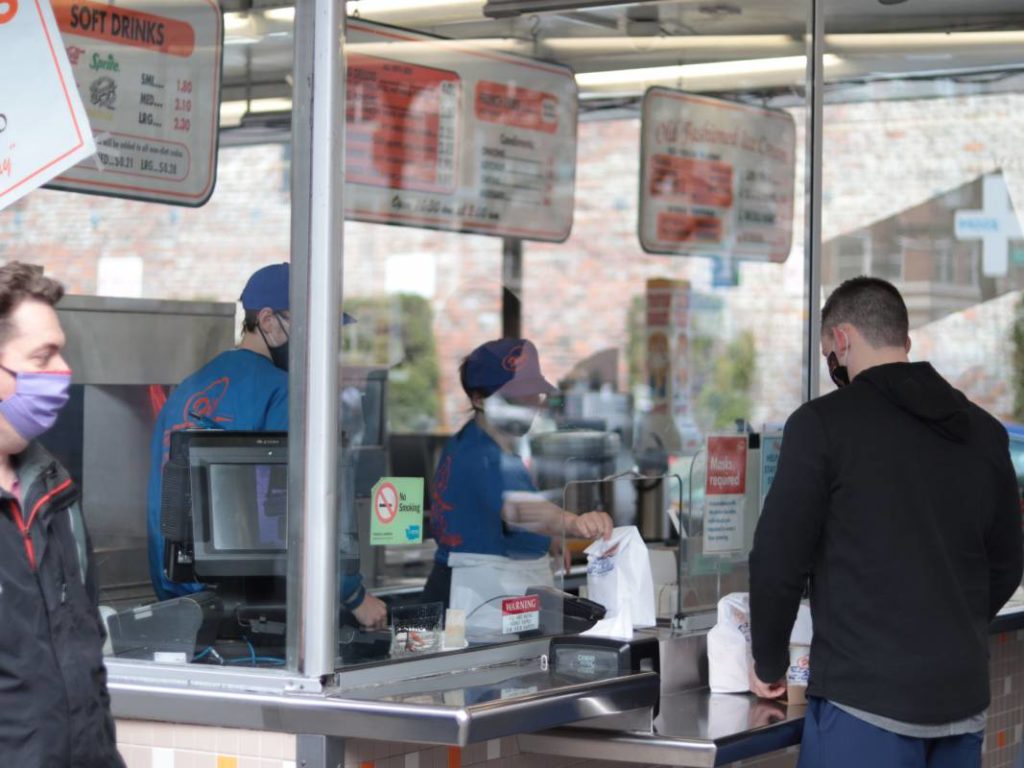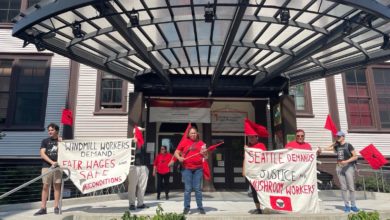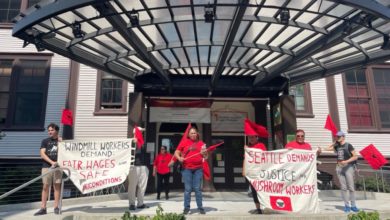Workers at Seattle-area hamburger chain Dick’s Drive-In have filed formal complaints about workplace conditions that violate COVID-19 operations guidelines at two of the company’s locations. The complaints, filed with the Washington State Department of Labor and Industries on March 10, allege that conditions at the company’s Broadway and Lower Queen Anne locations in Seattle are in violation of pandemic safety guidelines, as well as other basic health requirements. (SeattleEater.com)
According to these complaints, the company did not provide workers with any training on coronavirus symptoms or prevention and pressured them to come to work while waiting for COVID-19 test results. Employees were required to work without adequate space for social distancing. Management and security poorly enforced their mask policy, with customers and co-workers sometimes failing to wear masks. The workers were “instructed not to turn away maskless customers but rather to serve customers faster to avoid prolonged contact.” (Seattle Times)

In addition, the employees accuse management of flouting even basic health guidelines, failing to require frequent handwashing, or even to provide adequate time for workers to do so. Sanitization was carried out on an irregular schedule using “rags that sit in a bleach and water solution that is infrequently replaced.” Flooring in the kitchen and register areas was loose or slippery, which caused some employees to slip and fall.
One of the complainants reported that at times employees had to stand on an electric heater in the middle of a pool of water in order to use the cash register. “There is mold or mildew in multiple places in the restaurant,” said one of the workers, “including the icebox, the walk-in freezer, and in the dip wells for ice cream scoops.” One employee even made multiple visits to the emergency room after being burned from heaters or from melted gloves.
The company responded to the allegations by denying any awareness of these hazardous conditions. “We take the safety of our employees and our customers very seriously,” they told the Seattle Times on March 10.
Two days later, the company’s Facebook page debuted what appears to be a professionally produced video featuring company president Jasmine Donovan demonstrating some of the precautionary COVID-19–related measures at one of their locations.
Dick’s Drive-In opened its first location in Seattle’s Wallingford neighborhood in 1954, and has since come to be widely recognized as a Seattle institution. The company is family-owned, and has played a controversial — and often contradictory — role in the local conversation about worker compensation and benefits.
On the one hand, the company cultivates a reputation for corporate generosity due to their policy of offering scholarships and health insurance for employees who work a minimum of 20 hours per week, and a relatively high starting wage. On the other hand, Donovan has prominently spoken out in opposition to pro-worker public policy. In 2014, Donovan, granddaughter of company founder Dick Spady, attempted to discourage the passing of Seattle’s current $15 minimum wage at a Town Hall event by threatening to raise menu prices and cut employer-provided health insurance. (KOMO News)
In spite of these threats, the company appears to be thriving, and is presently in the process of establishing an eighth location in Seattle’s suburb of Bellevue, Wash., anticipated to open by the end of this year.
This wasn’t the last time Donovan went on record advocating for voluntary corporate philanthropy as an alternative to public policy. In 2018, Seattle’s City Council passed a head tax on larger businesses in an attempt to fund services for the more than 12,000 homeless residents of the city at the time. The decision was met with an outpouring of opposition from highly profitable big businesses that operate in the area, including Amazon, Starbucks, Kroger and Albertsons. This pushback ultimately resulted in city council recalling the decision shortly afterward. (Working Washington)
During the controversy, Donovan co-signed an op-ed in the Seattle Times that provided misinformation about the efficacy of the city’s homelessness reduction efforts up to that point. This was an attempt to make the case that the homelessness crisis would be resolved more efficiently through voluntary charity donations.
Donovan’s brother Saul Spady, a former talk radio host, took an even more extreme position the following year when he proposed that the homelessness crisis could be resolved or alleviated through the establishment of “farm jails” for people suffering from drug addiction who “commit a property or other non-violent crime.” In response to fallout from these comments, Donovan asserted that her brother is not officially part of the company, though they do partner with his marketing firm.
All progressive people should support the struggle of Dick’s Drive-In workers for a safe and dignified workplace.





